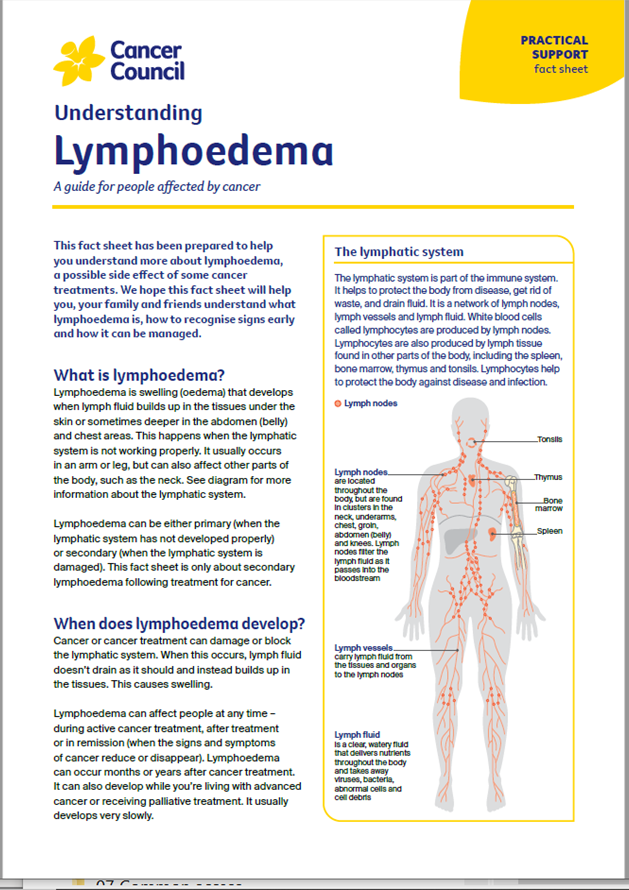- Home
- Head and neck cancers
- Managing side effects
- Lymphoedema
Lymphoedema
If lymph nodes have been removed in a neck dissection or damaged by radiation therapy, this may prevent lymph fluid from draining properly. The fluid can build up and cause swelling in the neck, face and throat. This is known as lymphoedema. It can be temporary or permanent and may change your appearance.
People who have had surgery followed by radiation therapy to the neck are more at risk, especially if both sides of the neck are treated. You are also more likely to develop lymphoedema if a lot of lymph nodes were removed.
For more on this call Cancer Council 13 11 20, or see Lymphoedema.
Learn more about:
What are the signs of lymphoedema?
Symptoms of lymphoedema can be easier to manage if the condition is treated early. The main signs of lymphoedema include swelling, redness and skin warmth, which may come and go. Sometimes the swelling develops internally and is hard to see but the area may feel different (e.g. mild tingling). It is important to look out for these signs and to visit your doctor if they appear.
Preventing and managing lymphoedema
Sometimes the swelling and other signs of lymphoedema can take months or years to develop, although some people who are at risk never develop the condition.
Some hospitals have specialist physiotherapists and occupational therapists who can teach you simple exercises to reduce your risk of developing lymphoedema, or show you ways to manage it if you have it already. There are also private lymphoedema practitioners who can help with prevention and offer treatments such as lymphatic drainage massage, exercises, low-level laser therapy, skin care and compression garments, if needed.
For more on this, see our general section on Lymphoedema.
To find a lymphoedema practitioner, visit the Australasian Lymphology Association (ALA).
→ READ MORE: Life after treatment
Podcasts for people affected by cancer
Listen now
A/Prof Martin Batstone, Oral and Maxillofacial Surgeon and Director of the Maxillofacial Unit, Royal Brisbane and Women’s Hospital, QLD; Polly Baldwin, 13 11 20 Consultant, Cancer Council SA; Martin Boyle, Consumer; Dr Teresa Brown, Assistant Director Dietetics, Royal Brisbane and Women’s Hospital, Honorary Associate Professor, University of Queensland, QLD; Dr Hayley Dixon, Head, Clinical Support Dentistry Department, WSLHD Oral Health Services, Public Health Dentistry Specialist, NSW; Head and Neck Cancer Care Nursing Team, Royal Melbourne Hospital, VIC; Rhys Hughes, Senior Speech Pathologist, Peter MacCallum Cancer Centre, VIC; Dr Annette Lim, Medical Oncologist and Clinician Researcher – Head and Neck and Non-melanoma Skin Cancer, Peter MacCallum Cancer Centre, VIC; Dr Sweet Ping Ng, Radiation Oncologist, Austin Health, VIC; Deb Pickersgill, Senior Clinical Exercise Physiologist, Queensland Sports Medicine Centre, QLD; John Spurr, Consumer; Kate Woodhead, Physiotherapist, St Vincent’s Health, Melbourne, VIC; A/Prof Sue-Ching Yeoh, Oral Medicine Specialist, University of Sydney, Sydney Oral Medicine, Royal Prince Alfred Hospital, Chris O’Brien Lifehouse, NSW.
View the Cancer Council NSW editorial policy.
View all publications or call 13 11 20 for free printed copies.
